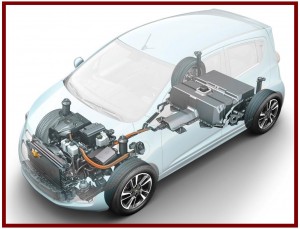
Spark will be the first electric vehicle from GM since the ill-fated EV1 when California was mandating that EVs make up 10% of the U.S.'s largest car market. Note the cooling lines running to the rear-mounted battery pack in this early GM cutaway.
A123 Systems (Nasdaq: AONE), a developer and manufacturer of nanophosphate lithium iron batteries and systems, today introduced Nanophosphate EXT, a new lithium ion battery technology that it claims is capable of operating at extreme temperatures without requiring thermal management.
The struggling company said this morning that the new battery chemistry will significantly “reduce or eliminate the need for heating or cooling systems.”
The announcement follows $55 million recall started in March for A123 lithium ion batteries after the well-publicized failure during testing of a Fisker Karma that was owned by Consumer Reports. A123, an investor in Fisker, lost almost $260 million in 2011. During Q1 of 2012, total revenue was $10.9 million, a decrease of 40% from $18.1 million in the first quarter of 2011. Operating loss was $130 million. Within total revenue, product revenue was $7.3 million, a 53% decrease from $15.5 million in the first quarter of 2011, and services revenue was $3.6 million, compared to $2.6 million in the first quarter of 2011. Net loss was ($125.0) million, or ($0.87) per common share, based on 143.4 million common shares outstanding in the first quarter of 2012. This compared to a net loss of ($53.6) million in the first quarter of 2011, or ($0.51) per common share, based on 105.5 million.
A123 received a $249.1 million grant from the Department of Energy to reopen plants in Livonia and Romulus, Mich., as well as money and tax credits from Michigan worth more than $100 million. The full completion of the Livonia factory is now stalled, as A123 is running out of capital – cash or equivalents of $113.1 million as of March 2012 – and demand for EVs and batteries remains weak.
The future of the company, which has never earned a profit, is not clear, and it’s now part of a contentious campaign debate about Democratic subsidies to advanced technology companies, including solar panel maker Solyndra whose bankruptcy cost taxpayers half a billion dollars. What is clear is that President Obama’s forecast of 1 million EVs on the road by 2015 is wrong. Thus far, sales of EVs in the U.S. have been disappointing to boosters of the advanced, clean running vehicles. Through May of this year the $42,000 Chevrolet Volt, which GM insists is an extended range EV, sold 7,000 vehicles. The Nissan Leaf EV sold 2,613 ytd. (See A123 Recalls Lithium Ion Batteries Shipped to Fisker, Others and Fisker Expands Karma Battery Recall for Potential Fires)
“We continue to emphasize innovation with a commercial purpose, and we expect Nanophosphate EXT to strengthen our competitive position in existing target markets as well as create new opportunities for applications that previously were not possible to cost-effectively serve with lithium ion batteries,” said David Vieau, CEO of A123.
A123 Systems will supply the nanophosphate lithium-ion battery packs that will power the Chevrolet Spark EV when it enters production in 2013. (See Chevrolet to Produce Spark EV All-Electric Vehicleand GM Awards A123 Contract for Batteries for Electric Vehicles) A123 uses nanophosphate as a positive electrode material that is claimed to have higher usable energy than other lithium ion technologies. This – in theory – enables greater battery use. The revised battery chemistry will be available to automakers for testing later this year. Testing is one thing, production contracts are quite another hurdle the company faces.
According to A123, unlike lead acid or other advanced battery technologies, Nanophosphate EXT is designed to maintain long cycle life at extreme high temperatures and deliver high power at extreme low temperatures.
The company cited testing performed to date at the Ohio State University’s Center for Automotive Research (CAR) and the very low observed rate of aging. Battery cells built with Nanophosphate EXT are expected to retain more than 90% of initial capacity after 2,000 full charge-discharge cycles at 45 degrees Celsius. CAR has also starting testing the cold temperature performance of Nanophosphate EXT, which A123 says will deliver a 20% increase in power at temperatures as low as -30 degrees Celsius.
“Based on our analysis, the performance of A123’s new Nanophosphate EXT at high temperatures is unlike anything we’ve ever seen from lead acid, lithium ion or any other battery technology,” said Dr. Yann Guezennec, senior fellow at CAR and professor of mechanical engineering at the Ohio State University.
Nanophosphate EXT is expected to improve the cold-cranking capabilities of A123’s lithium ion 12V Engine Start battery. This would eliminate the only performance advantage of lead acid in starter battery applications, and is expected to increase the “value proposition” of A123’s Engine Start battery as a lighter-weight, longer-lasting alternative to absorbent glass mat (AGM) and other lead acid batteries.
A123 says that this will reduce the total cost of ownership for micro hybrid applications, which represents a growing subset of the global electric vehicle market. According to Lux Research, the worldwide market for micro hybrids will reach more than 39 million vehicles in 2017, creating a $6.9 billion market for energy storage devices.

